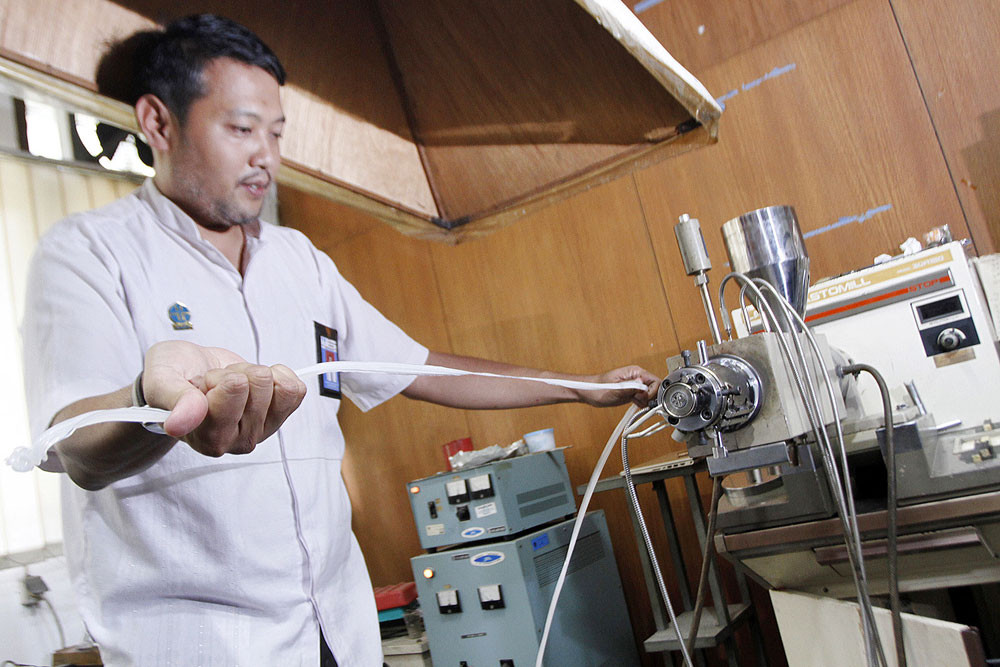Popular Reads
Top Results
Can't find what you're looking for?
View all search resultsPopular Reads
Top Results
Can't find what you're looking for?
View all search resultsIndonesia's science law brings back memories of New Order era restrictions on academic freedom, scholars say
The law states that without clearance from authorities, scientists can face penalties for conducting ‘dangerous’ research, a term prone to be liberally interpreted by leaders with authoritarian tendencies.
Change text size
Gift Premium Articles
to Anyone
S
cholars say that clauses in Indonesia’s new science law are prone to political abuse from authorities under the guise of ‘national security’, threatening academic freedom.
The law states that without clearance from authorities, scientists can face penalties for conducting ‘dangerous’ research, a term prone to be liberally interpreted by leaders with authoritarian tendencies.
Herlambang Wiratraman, Director of the Centre of Human Rights Law Studies in Universitas Airlangga, says that the ‘dangerous research’ clause can potentially deter Indonesia’s research climate.
Thousands of students took to the streets across Indonesia in late September. Although the science law, passed in August, was lesser known, it was considered amongst the series of controversial legislation that led to the nationwide protests.
The science law requires that all research considered ‘dangerous’ must be done with a permit issued by the central government, after being cleared by an ad hoc ethics committee.
The law further elaborates that research falling under this category are those that might threaten ‘social harmony’ and ‘national security’, amongst other criteria.
Those who do not comply with these regulations risk one year in jail and fines up to approximately US$140,000.
Herlambang argues that these provisions contain definitions that can provide room for liberal interpretation by authorities, particularly regarding topics that the government considers sensitive.
“If there is research that studies people in the inland areas [in Papua] to identify actors central to peace dialogues or analyse the conflict, the state or military might perceive it to be against national security, when in fact it is social research adhering to the scientific process,” he said.
“Is that what ‘dangerous’ means? Without clear and rigid definitions, I’m worried that the law might be abused in its practice.”
Read also: 'We must speak up!': academics endorse student movement despite government pressure
A chapter from the past
Herlambang says that these potential threats to academic freedom bring back memories of New Order-era restrictions on academic freedom, albeit with different characteristics.
“Today, 20 years after Soeharto, pressure can appear from anywhere and anytime. The academic disciplining that used to be centralised is now no longer the case.”
“Academic discussions are being disbanded, film screenings are stopped, and even a lecturer in Aceh who designed a cross-religious teaching method was threatened. There are a variety of situations after Soeharto fell.”
The Universitas Airlangga lecturer, who is also the president of the Indonesian Caucus for Academic Freedom (KKAI), further argued that these ‘dangerous research’ clauses present in the science law could make Indonesia revert to its dark days.
“It is possible some articles in the law can return the state as a central actor where it meddles too much with how knowledge and science progresses,” he said.
Read also: Academic freedom is under threat around the world – here's how to defend it
A 1998 report from Human Rights Watch explains in detail the mechanisms Soeharto-era government used in curbing academic freedom.
During Soeharto’s period in power, the government carried out background checks for teaching staff and criminalised dissenting academics such as Sri Bintang Pamungkas. The government also enacted a set of governmental decrees that restricted political expression in universities – the so-called “Normalisation of Campus Life” or NKK/BKK,
Soeharto also placed restrictions on academic research. Scientists who wish to conduct fieldwork must gain the approval of the political office of the Home Ministry, often called ‘sospol’, which has the authority to forbid research and maintain a blacklist of both researchers and research topics.
The requirement above has steered academics away from controversial research subjects during the New Order, something that Herlambang worries might happen again with the new science law.
Ensuring office-holders with academic integrity
Fajri Siregar, a University of Amsterdam PhD candidate, specialising in the study of knowledge production agrees with concerns that Indonesia’s climate of academic freedom has regressed over the years.
However, Fajri believes that a lot of provisions introduced in the science law are important, especially for the protection of biodiversity and biological samples.
“For example, some germplasms or genetic samples are often taken from Indonesia without the required permits. The consideration is more like that, relating to protection,” he said.
But he acknowledged the risk that authoritarian individuals might use the law for political purposes. “But yes, I’m worried about that. There could be figures who feel certain research don’t fit with ‘Indonesian morals’ or norms, and this law is then used,” he said.
He hopes that the relevant positions of authority are filled by experienced figures with proven track records in academia, without having any vested interests in politics or backed by it.
Fajri also says that there is still room to dampen the risks of political abuse through strong and well designed governmental regulations (peraturan pemerintah/PP).
The government has yet detailed how the ethics committee, which decides whether research is deemed dangerous or not, will work. Creating bylaws that ensure those who sit on it adhere to principles of academic freedom is crucial.
“Most parts of the law still require further governmental regulations. But one fight at a time,” he said.
Herlambang supports this notion. He adds that only scientific criteria can be used to decide what can be considered ‘dangerous’ and what is not.
“Those who are actually qualified to determine restrictions are not the regime or government, but scientists themselves. So that what qualifies as ‘dangerous’ aligns with scientific principles, not political,” he said.
***
Luthfi T. Dzulfikar, Associate Editor, The Conversation
This article was firstly published on The Conversation under a Creative Commons license. Read the original article.










